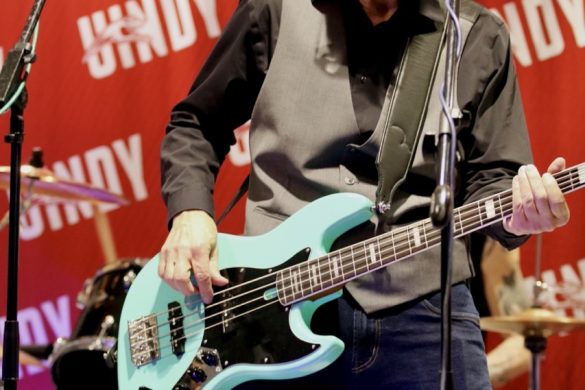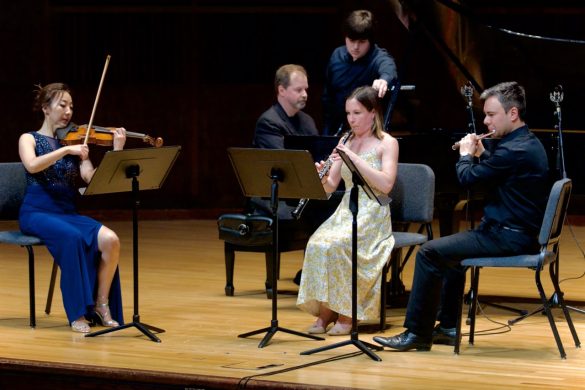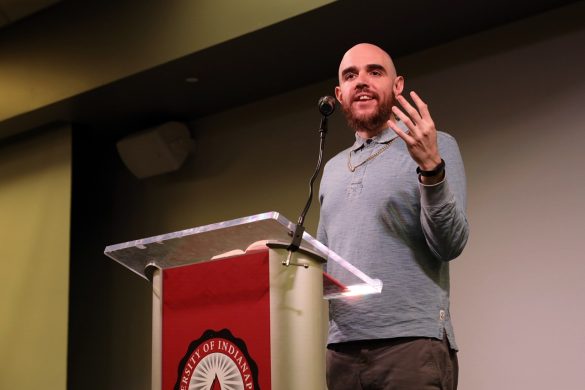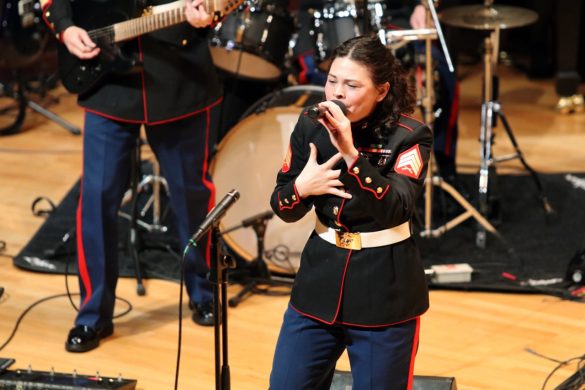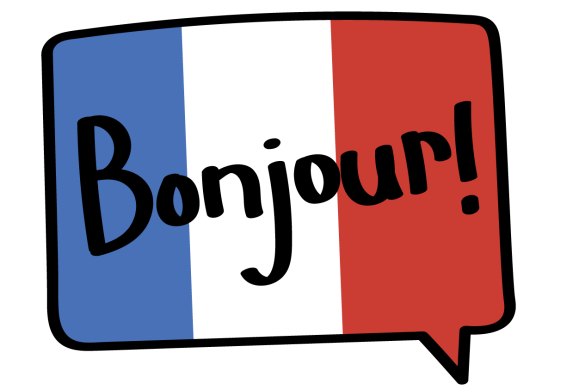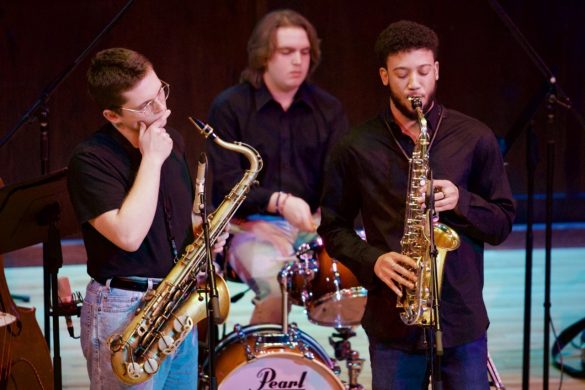“Heroes and Villains” visited the University of Indianapolis as part of the Faculty Artist Concert Series on Feb. 29 in the Ruth Lilly Performance Hall of the Christel DeHaan Fine Arts Center. The recital featured pieces by Franz Schubert, Charles Ives, Jacques Ibert, Leonard Bernstein and many others. Music Lessons Adjunct faculty member Daniel Narducci sang baritone while Staff Accompanist Greg Martin played the piano.
The performance was broken into six sets, each with a different theme in the heroes and villains categories, from a wide range of composers and inspirations.
“Mythology, literature and motion pictures are filled with examples of heroes, villains and the good or evil that they bring upon mankind,” according to the event program. “[‘Heroes and Villains’] represents a look at some of the diverse personalities that we recognize as heroes or villains, coming into our awareness through myth, literature or true life.”

Daniel Narducci, music lesson adjunct faculy member, performs at the “Heroes and Villians” concert in the Ruth Lilly Performance Hall on Feb. 29. Photo by Madison Hays
The performance began by focusing on heroes, with the first set featuring “Bois épais” by Jean-Baptiste Lully, from “Amadis,” a French opera focusing on love and chivalry. This set also included “Ô Richard, ô mon roi!” from “Richard Coeur-de-lion,” by André Grétry.
The second set was by Franz Schubert. “Die Götter Griechenlands,” “Der Enthsühnte Orest” and “An die Leier” were performed.
“Franz Schubert found inspiration in ancient Greek myths and legends for many of his songs,” according to the event program, “and this group of songs presents settings of poems based on Greek mythology.”
The next set of songs was from “Chansons de Don Quichotte,” by Jacques Ibert. Ibert contributed four songs for the film “Don Quixote.”
“The original scoring was for various forces, from small ensemble to full orchestra, but Ilbert also arranged them for voice and piano,” according to the program. “This is the arrangement presented today … “Chanson du départ” is by Pierre de Ronsard, and the other three are by Alexandre Arnoux.”
The four pieces were originally poems in which Ibert composed the accompanying music.
Freshman elementary education major Liz Van Allen attended the performance for Lecture/Performance credit and to be able to write a paper for her Introduction to Music class. She enjoyed the set that focused on Don Quixote.
“I like the whole piece on Don Quixote,” Van Allen said. “I had to read it in high school so it was cool to see performed.”
The fourth set featured songs inspired by Native Americans. It included “Song of the Deathless Voice,” by Arthur Farwell, and was from the tribe on the Omaha plains and incorporated their language into the song. Charles Ives’s “The Indians” also was performed. According to the program, the song focuses on tragic events that affected Native American culture. The set was rounded out with “From Land of the Sky-Blue Water,” by Charles Wakefield Cadman, which also focuses on the Omaha tribe.
The set of villainous songs began with “The Listeners,” by Norman Dello Joio. It is about a traveler trying to be heard while traveling through a quiet night. Next “Song of Black Max,” by William Bolcom was performed.
“William Bolcom’s ‘Song of Black Max’ is composed in the tradition of Bertolt Brecht and Kurt Weill,” according to the program. “It is reminiscent of one of their most well-known songs, ‘Mack the Knife.’”
To end the set of villainous songs was “Captain Hook’s Soliloquy” from “Peter Pan,” by Leonard Bernstein. It is sung by the character of Captain Hook, who believes that he has just killed Peter Pan.
Freshman music education major Brenden Everett was particularly impressed with “Captain Hook’s Soliloquy.”
“What was really cool is when he sang the Captain Hook song … and he [Narducci] was in character,” Everett said. “It was refreshing to watch him perform.”
The final set of the night celebrated the heroism of those who served in the World Wars. “He is There!” by Charles Ives, was performed first. According to the program, it includes quotations from at least 14 different patriotic songs, such as “The Battle Cry of Freedom,” “Columbia, Gem of the Ocean” and “The Star-Spangled Banner.” The next two songs performed were by Gene Scheer, “Holding Each Other” and “At Howard Hawks’ House.”
The final song was sung by British soldiers as they enlisted and was later sung to help heal them from the shock of the war. It was “Roses of Picardy,” by Haydn Wood, and was his most successful song, according to the program.
Following the performance, Narducci and Martin returned to the stage and performed another song from “Don Quixote.” Everett said this was his favorite song of the night.
Van Allen said that she enjoyed the performance.
“I was surprised,” she said. “I didn’t know what to expect. [I] liked it.”
Everett, who attended the performance because Narducci is his professor, said that he learned a lot.
“There was a lot of stuff he did in terms of vocal technique,” he said. “I won’t get into the specifics but there was a lot of stuff with his stance.”
Everett was impressed with the way Narducci was in character for many of the songs and sang in French and German, as well as English.
The next performance in Ruth Lilly Performance Hall is the Symphonic Wind Ensemble and Chamber Orchestra on March 10 at 7:30 p.m.

